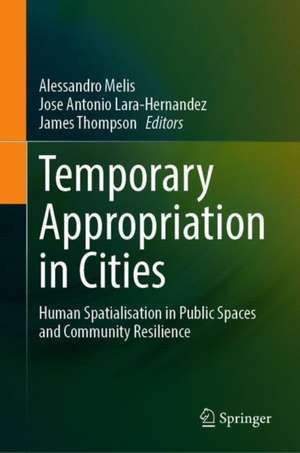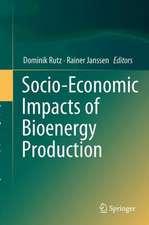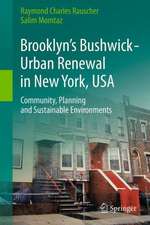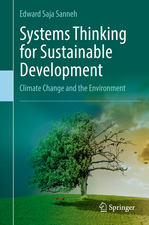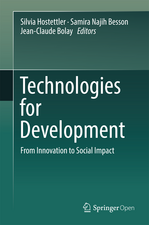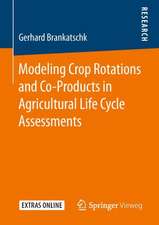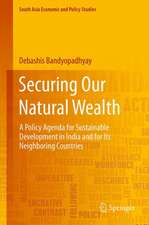Temporary Appropriation in Cities: Human Spatialisation in Public Spaces and Community Resilience
Editat de Alessandro Melis, Jose Antonio Lara-Hernandez, James Thompsonen Limba Engleză Hardback – 2020
The book explores the complex and the multi-scalar nature of temporary appropriation, and touches on its relationship to issues such as:
- sustainability and building re-use;
- culture;
- inclusivity, including socio-spatial inclusion;
- streetscape design;
- homelessness; and
- regulations controlling the use of public spaces.
Preț: 786.66 lei
Preț vechi: 959.34 lei
-18% Nou
Puncte Express: 1180
Preț estimativ în valută:
150.54€ • 163.47$ • 126.46£
150.54€ • 163.47$ • 126.46£
Carte tipărită la comandă
Livrare economică 22 aprilie-06 mai
Preluare comenzi: 021 569.72.76
Specificații
ISBN-13: 9783030321192
ISBN-10: 3030321193
Pagini: 256
Ilustrații: XXVI, 256 p.
Dimensiuni: 155 x 235 mm
Greutate: 0.58 kg
Ediția:1st ed. 2020
Editura: Springer International Publishing
Colecția Springer
Locul publicării:Cham, Switzerland
ISBN-10: 3030321193
Pagini: 256
Ilustrații: XXVI, 256 p.
Dimensiuni: 155 x 235 mm
Greutate: 0.58 kg
Ediția:1st ed. 2020
Editura: Springer International Publishing
Colecția Springer
Locul publicării:Cham, Switzerland
Cuprins
Chapter 1 General Introduction
Chapter 2 Understanding the Temporary Appropriation in Relationship to Social Sustainability
Chapter 3 Between Assemblages and Temporary Appropriation: The Case of Mexico City
Chapter 4 Temporary Appropriation and Informality
Chapter 5 Ongoing Appropriation: Invisible Seattle and Red May
Chapter 6 Temporary Appropriation and Public Space: Assessing the CPTED Principle of Activity Support Chapter 7 Temporary Appropriation of Public Spaces: The Influence of Outdoor Comfort
Chapter 8 Origins of Informality: Examining the Historical and Spatial Roots of Informal Day-Labor Hiring Sites
Chapter 9 Unsheltered Homelessness and the Right to Metabolism: An Urban Political Ecology of Health and Sustainability Chapter 10 Temporary Appropriation in Shanghai and Hong Kong: Two Study Cases Assessing the Resilience of Women Faced With the Lack of Affordable Housing
Chapter 11 (Temporary) Appropriation (Of Space), Makassar, and Urban Kampung
Chapter 12 Extending Temporary Appropriation Through Architecture: The Role of Adaptive Reuse in Shaping New Zealand’s Built Environment
Chapter 13 Using the Street in Mexico City Centre: Temporary Appropriation of Public Space Vs Legislation Governing Street Use Chapter 14 Transforming Everyday Public Space: Human Appropriations in Search for Citizenship and Urban Well-Being
Chapter 15 General Conclusion
Chapter 2 Understanding the Temporary Appropriation in Relationship to Social Sustainability
Chapter 3 Between Assemblages and Temporary Appropriation: The Case of Mexico City
Chapter 4 Temporary Appropriation and Informality
Chapter 5 Ongoing Appropriation: Invisible Seattle and Red May
Chapter 6 Temporary Appropriation and Public Space: Assessing the CPTED Principle of Activity Support Chapter 7 Temporary Appropriation of Public Spaces: The Influence of Outdoor Comfort
Chapter 8 Origins of Informality: Examining the Historical and Spatial Roots of Informal Day-Labor Hiring Sites
Chapter 9 Unsheltered Homelessness and the Right to Metabolism: An Urban Political Ecology of Health and Sustainability Chapter 10 Temporary Appropriation in Shanghai and Hong Kong: Two Study Cases Assessing the Resilience of Women Faced With the Lack of Affordable Housing
Chapter 11 (Temporary) Appropriation (Of Space), Makassar, and Urban Kampung
Chapter 12 Extending Temporary Appropriation Through Architecture: The Role of Adaptive Reuse in Shaping New Zealand’s Built Environment
Chapter 13 Using the Street in Mexico City Centre: Temporary Appropriation of Public Space Vs Legislation Governing Street Use Chapter 14 Transforming Everyday Public Space: Human Appropriations in Search for Citizenship and Urban Well-Being
Chapter 15 General Conclusion
Textul de pe ultima copertă
This book conceptualises and illustrates temporary appropriation as an urban phenomenon, exploring its contributions to citizenship, urban social sustainability and urban health. It explains how some forms of appropriation can be subversive, existing in a grey area between legal and illegal activities in the city.
The book explores the complex and the multi-scalar nature of temporary appropriation, and touches on its relationship to issues such as:
Since urban populations are certain to grow further, this is a key topic for understanding urban dynamics, and this book will be of interest to academics and practitioners alike.
The book explores the complex and the multi-scalar nature of temporary appropriation, and touches on its relationship to issues such as:
- sustainability and building re-use;
- culture;
- inclusivity, including socio-spatial inclusion;
- streetscape design;
- homelessness; and
- regulations controlling the use of public spaces.
Since urban populations are certain to grow further, this is a key topic for understanding urban dynamics, and this book will be of interest to academics and practitioners alike.
Caracteristici
Introduces temporary appropriation as a concept for analyzing human behavior, cities, and urban sustainability issues
Presents a cross-disciplinary analysis addressing themes such as citizenship, social sustainability, public health, and crime
Brings together contributions by international authors with various areas of expertise
Presents a cross-disciplinary analysis addressing themes such as citizenship, social sustainability, public health, and crime
Brings together contributions by international authors with various areas of expertise
